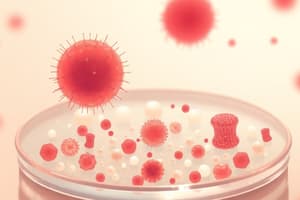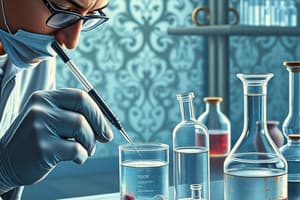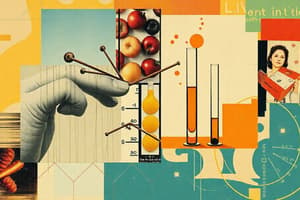Podcast
Questions and Answers
What is the dilution factor achieved after performing six serial dilutions?
What is the dilution factor achieved after performing six serial dilutions?
- 10^-8
- 10^-4
- 10^-6 (correct)
- 10^-2
In the serial dilution procedure, what is done to the sample before moving to the next tube?
In the serial dilution procedure, what is done to the sample before moving to the next tube?
- Distinct samples are used each time.
- 10 ml is removed from the previous tube.
- Each tube is completely filled again.
- 1 ml is taken from the previous tube. (correct)
Which of the following is NOT an application of serial dilution in microbiology?
Which of the following is NOT an application of serial dilution in microbiology?
- Estimating the concentration of cells in a sample
- Diluting homeopathic substances
- Separating distinct bacterial species (correct)
- Obtaining desired reagent concentrations
What is a significant limitation of serial dilution?
What is a significant limitation of serial dilution?
What is the purpose of using a spread plate technique?
What is the purpose of using a spread plate technique?
What volume of inoculum is typically used in a spread plate method?
What volume of inoculum is typically used in a spread plate method?
Why might serial dilution be considered inefficient?
Why might serial dilution be considered inefficient?
Which statement about homeopathic dilutions is true?
Which statement about homeopathic dilutions is true?
What is the dilution factor of the first tube after adding the sample?
What is the dilution factor of the first tube after adding the sample?
What is the main purpose of serial dilution in microbiology?
What is the main purpose of serial dilution in microbiology?
Which of the following is a limitation of the serial dilution technique?
Which of the following is a limitation of the serial dilution technique?
In the serial dilution process, what is done with the pipette after transferring the dilution to the next tube?
In the serial dilution process, what is done with the pipette after transferring the dilution to the next tube?
After counting colonies, how is the number of microorganisms in the original sample calculated?
After counting colonies, how is the number of microorganisms in the original sample calculated?
What is the highest dilution factor achievable using six sterile tubes in a serial dilution sequence?
What is the highest dilution factor achievable using six sterile tubes in a serial dilution sequence?
What technique can be employed to apply a measured volume from the dilutions to the agar plates?
What technique can be employed to apply a measured volume from the dilutions to the agar plates?
Why should a marker pen be used during colony counting?
Why should a marker pen be used during colony counting?
What is the dilution factor achieved when 1 ml of sample is diluted into 9 ml of sterile diluent?
What is the dilution factor achieved when 1 ml of sample is diluted into 9 ml of sterile diluent?
Which step in the serial dilution procedure indicates a proper mix of the solution in the test tube?
Which step in the serial dilution procedure indicates a proper mix of the solution in the test tube?
What is one primary application of serial dilution in microbiology?
What is one primary application of serial dilution in microbiology?
Which limitation is associated with the serial dilution technique?
Which limitation is associated with the serial dilution technique?
What is the maximum recommended number of colonies to be counted from a dilution plate for reliable results?
What is the maximum recommended number of colonies to be counted from a dilution plate for reliable results?
What methodology is used to transfer a small volume from one dilution tube to another in serial dilution?
What methodology is used to transfer a small volume from one dilution tube to another in serial dilution?
Which factor influences the extent of dilution in a serial dilution series?
Which factor influences the extent of dilution in a serial dilution series?
What is measured to determine the total dilution factor in a serial dilution series?
What is measured to determine the total dilution factor in a serial dilution series?
Flashcards
Serial Dilution
Serial Dilution
A process of progressively diluting a sample to get a range of dilutions for microbial counting.
Dilution Factor
Dilution Factor
The ratio of the initial sample volume to the final diluted volume. E.g., 1cm³ of sample in 9cm³ diluent is a 1/10 or 10⁻¹ dilution.
Pour Plates
Pour Plates
A method of plating a diluted sample where the diluted sample is mixed with melted agar then poured into a petri dish.
Spread Plates
Spread Plates
Signup and view all the flashcards
Colony Count
Colony Count
Signup and view all the flashcards
Microbial Count
Microbial Count
Signup and view all the flashcards
Countable Plate Range
Countable Plate Range
Signup and view all the flashcards
Calculating micro-organisms/cm³
Calculating micro-organisms/cm³
Signup and view all the flashcards
Final Dilution (Serial)
Final Dilution (Serial)
Signup and view all the flashcards
Spread Plate Technique
Spread Plate Technique
Signup and view all the flashcards
Colony Count (Spread Plate)
Colony Count (Spread Plate)
Signup and view all the flashcards
Serial Dilution Inaccuracies
Serial Dilution Inaccuracies
Signup and view all the flashcards
Time Efficiency in Serial Dilution
Time Efficiency in Serial Dilution
Signup and view all the flashcards
Serial Dilution Applications
Serial Dilution Applications
Signup and view all the flashcards
Spread Plate Use in Sensitivity Testing
Spread Plate Use in Sensitivity Testing
Signup and view all the flashcards
Total Dilution Factor
Total Dilution Factor
Signup and view all the flashcards
Why use serial dilution?
Why use serial dilution?
Signup and view all the flashcards
Estimating original concentration
Estimating original concentration
Signup and view all the flashcards
Pour Plate Method
Pour Plate Method
Signup and view all the flashcards
Spread Plate Method
Spread Plate Method
Signup and view all the flashcards
Study Notes
Serial Dilution
- Serial dilution is a technique used to reduce the concentration of a substance, often a liquid culture, in a series of steps.
- The purpose is to create a range of successively lower concentrations for analysis or testing.
- The technique is used for estimating unknown concentrations, performing experiments on cells, or to make dilutions for various uses.
- Serial dilutions involve taking a sample and repeatedly diluting it with a sterile diluent (like distilled water or saline) to create multiple samples of decreasing concentration
Serial Dilution Objectives
- Estimate the concentration of an unknown sample by counting colonies grown from dilutions.
- Reduce the cell density to allow easier calculation of the initial concentration.
- Avoid pipetting very small volumes for dilutions.
- Obtain plates with easily countable colonies (30-100).
- Calculate the number of microbes in the original sample.
Serial Dilution Formulas/Calculations
- Serial dilution uses standard volumes of sterile diluent (water or saline)
- A small volume of each dilution is used to make multiple plates for assessment.
- The dilution factor depends on the estimated density of the initial sample.
- The dilution factor for each tube in a set can be calculated: (Volume of sample)/(Volume of sample + Volume of diluent).
- For a tenfold dilution, 1 ml of sample is added to 9 ml of diluent.
- The total dilution factor in a series is the product of the individual dilution factors.
Serial Dilution Procedure
- Standard volumes of sterile diluent (water or saline) are placed in separate tubes.
- A measured volume of the initial sample is transferred to the first tube.
- This creates a 10-1 dilution.
- Additional volumes of each dilution are transferred to other tubes. This process is repeated. Each step is a 10X dilution.
- Each transfer is mixed thoroughly.
- The process is repeated until the desired dilution factor is reached.
Serial Dilution Applications
- Microbiology: Estimating concentration of cells or microbes to allow for easily countable colonies.
- Biochemistry: Obtaining desired concentrations of reagents.
- Pharmacology: Creating solutions with specific concentrations of chemicals for use.
- Homeopathy: Diluting substances into water or alcohol; believed to increase potency.
Serial Dilution Limitations/Problems
- Potential errors in sample transfer, especially with high-dilution samples.
- Stepwise nature takes more time than other methods.
- Does not separate cells from one another; other methods better suit this.
- Requires specific training and aseptic technique
Spread Plate Technique
- Spread plate technique is used to distribute cells evenly over the agar surface
- For sensitivity testing of bacteria, antibiotics, disinfectants
- Uses known volumes; used for quantitative work (colony counts).
- Produce between 30-100 colonies on the plates of appropriate dilutions.
- Used to measure number of bacteria or clumps per unit area based on known dilutions
Studying That Suits You
Use AI to generate personalized quizzes and flashcards to suit your learning preferences.




